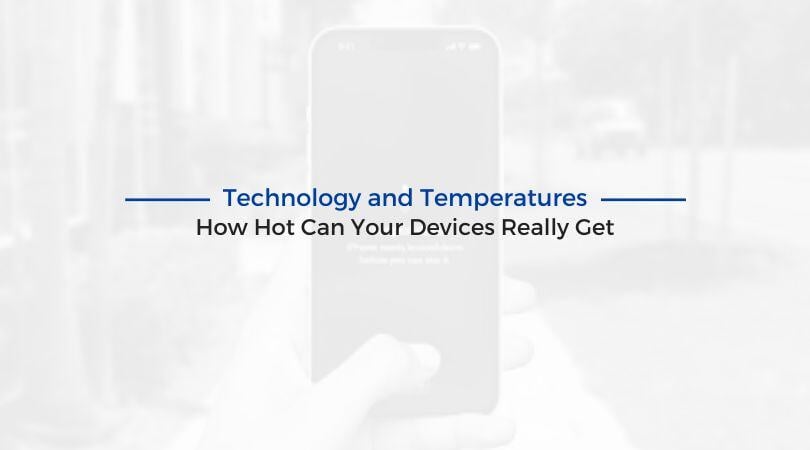Top 3 Technology Priorities for Your CPA Firm
You survived the second round of the “COVID busy season,” and these weird filing deadline changes make it feel like a “busy year.” Nonetheless, we...
2 min read
Megan Schutz : Updated on November 21, 2024

Summer has hit the Valley of the Sun. If you live in Phoenix like us, you’re familiar with the scorching temperatures of the summer months. This week alone, we have already reached 119…yikes!
Has your cellular device ever warned you that it has overheated and shut down to protect itself? Perhaps this has sparked your interest in technology devices and temperature. How hot can they really get? What is the difference between small personal devices and large business-grade devices?
We will cover it all in this blog so that you – and your devices – can survive this summer.
Let’s start with the basics – why should you avoid excessive heat with your technology devices? It’s not the screens we’re worried about but rather the device’s electronic components.
Consistently exposing electronic components to high temperatures can permanently damage a device. That’s why your iPhone will shut itself down if you leave it lying out in the sun, and on a business level, that’s why server rooms are carefully temperature-controlled with auto shut-offs if the air conditioning ever goes out.
Many personal devices are also programmed to power themselves down to avoid the risk of high temperatures. As temperatures increase, computer chip components experience thermal leakage – a waste of power. Most devices are designed to prevent this.
The recommended temperature limit is 95 degrees Fahrenheit for most electronics. While many are actually designed to withstand up to 176 degrees Fahrenheit, we don’t recommend testing that upper limit. Additionally, it’s not a one-and-destroyed type of situation. Consistent high temperatures over time can permanently damage your device, so watch your overall habits with your personal device and avoid all heat with business-grade devices.
Especially if you’ve ever had an old MacBook, you know that sometimes your devices get physically hot to the touch, even if they are in cool indoor temperatures. Why does this happen?
Many household electronics, such as DVD players, gaming systems, or computers, develop heat when in use. The energy created inside the machine is transferred into heat, making the outside of your device feel hot. This is a common occurrence with many devices.
While different from leaving your phone out in the boiling sun, you still want to avoid a device getting too hot. Place your hand on the back of your device, where you will most likely feel the heat. If it is hot to the touch, stop using the device, power it down, and give it a rest before resuming use.
Whether it’s your personal cell phone or your business server when the hot temperatures start to hit Arizona in the Spring, make sure you have a plan. Most electronics operate best when kept at a temperature of 85°F or lower. Equipment life expectancy can lower as much as 40% when electronics are used consistently at higher temperatures.
Carefully temperature-controlling business-grade devices and servers is vital to longevity and optimal operation. At home, avoid installing devices near heat sources, such as pipes, radiators, and vents. Never leave your phone in the car if the temperatures outside are hot! Even simple efforts to avoid direct sunlight exposure will help reduce the risk of your device overheating.
On a business level, if you have questions about protecting devices and servers during the summer months, PK Tech can advise you on optimal operation procedures. With over ten years of experience in the Greater Phoenix Area, we understand what it means to survive the summer – both us humans and our technology. Get in touch with our team here if you have questions.

You survived the second round of the “COVID busy season,” and these weird filing deadline changes make it feel like a “busy year.” Nonetheless, we...

You’ve likely heard about the tariffs on goods from China in the news. US consumers and business are already seeing the effects. The exact structure...

While perhaps a little late to the game, but a welcomed change nonetheless, Microsoft has officially rolled out a new schedule send feature for...